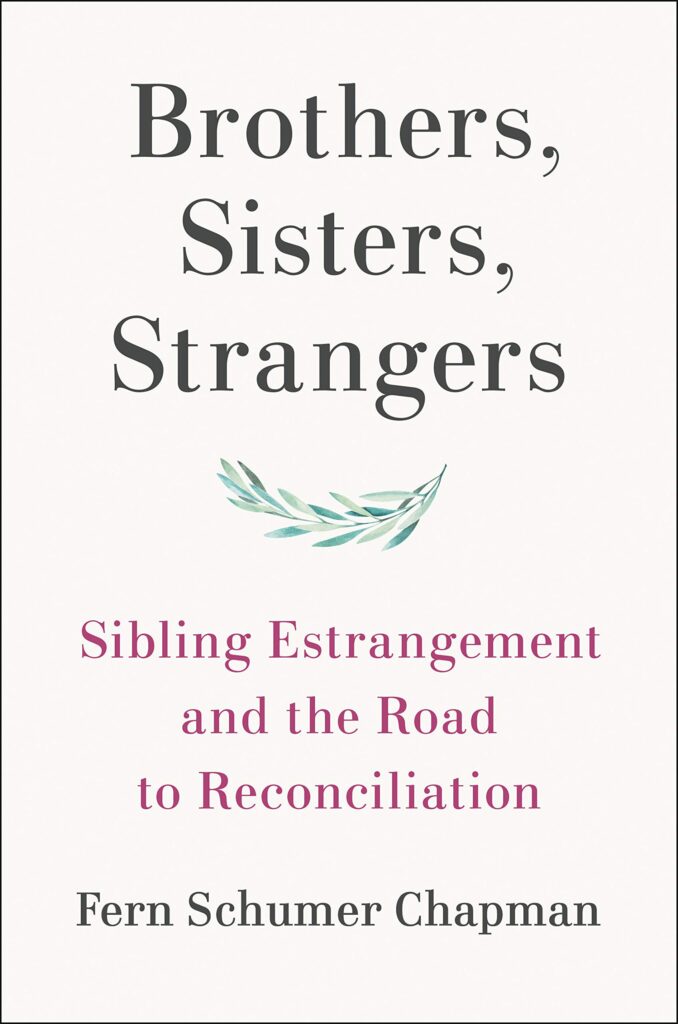
Brothers, Sisters, Strangers: Sibling Estrangement and the Road to Reconciliation by Fern Schumer Chapman
Fern Schumer Chapman understands the pain of sibling estrangement firsthand. For the better part of forty years, she had nearly no relationship with her only brother, despite many attempts at reconnection. Her grief and shame were devastating and isolating. But when she tried to turn to others for help, she found that a profound stigma still surrounded estrangement, and that very little statistical and psychological research existed to help her better understand the rift that had broken up her family. So she decided to conduct her own research, interviewing psychologists and estranged siblings as well as recording the extraordinary story of her own rift with her brother, and subsequent reconciliation.
Brothers, Sisters, Strangers is the result – a thoughtfully researched memoir that illuminates both the author’s own story and the greater phenomenon of estrangement. Chapman helps readers work through the challenges of rebuilding a sibling relationship that seems damaged beyond repair, as well as understand when estrangement is the best option. It is at once a detailed framework for understanding sibling estrangement, a beacon of solidarity and comfort for the estranged, and a moving memoir about family trauma, addiction, grief, and recovery.

Rejected, Shamed & Blamed: Help and Hope for Adults in the Family Scapegoat Role by Rebecca Mandeville
Scapegoating in any social system is a dehumanizing process of ‘othering’. When you are the target of scapegoating in your family-of-origin, the consequences to your mental and emotional health can be severe, including the development of complex trauma (C-PTSD) symptoms. This introductory guide’s purpose is to help the reader determine if they are in the ‘family scapegoat’ role while educating on family scapegoating dynamics and the devastating consequences of being ‘rejected, shamed, and blamed’ by the people who were supposed to love and care for them the most.
Family scapegoating is an insidious form of “invisible” abuse that is difficult to recognize. It is therefore critical that adult survivors of dysfunctional or narcissistic family systems understand what type of abuse they are trying to recover from. In Rejected, Shamed, and Blamed, Licensed Psychotherapist and Family Systems expert Rebecca C. Mandeville uses her research findings on what she named ‘Family Scapegoating Abuse’ (FSA) to help survivors recognize and release the damaging ‘scapegoat’ narrative associated with the family ‘identified patient’ role.
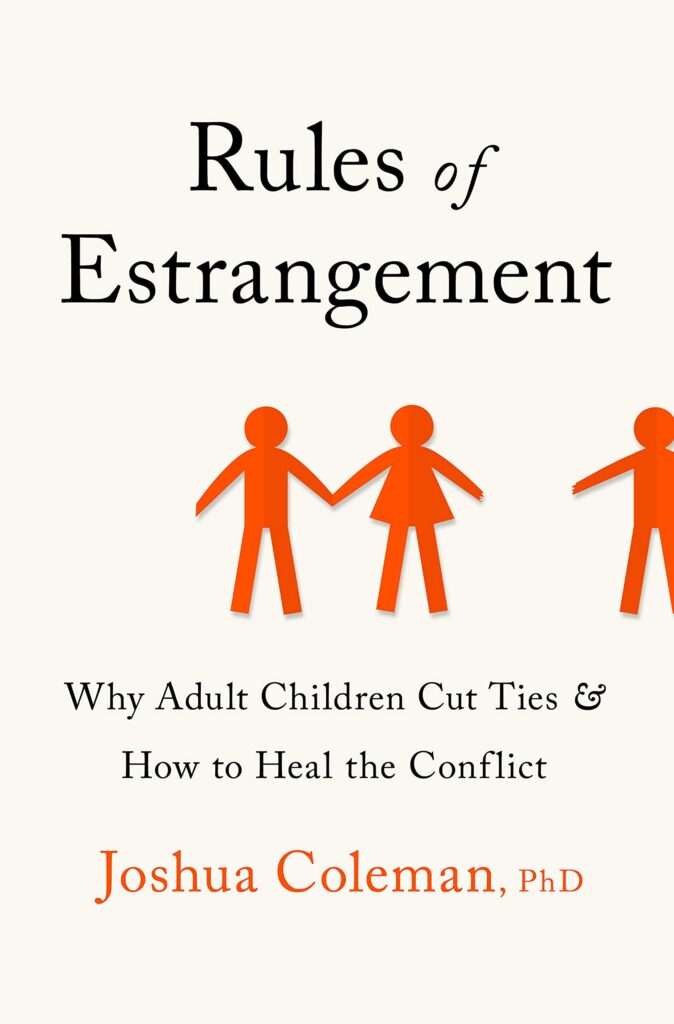
Rules of Estrangement: Why Adult children Cut Ties & How to Heal the Conflict by Joshua Coleman
Labeled a silent epidemic by a growing number of therapists and researchers, estrangement is one of the most disorienting and painful experiences of a parent’s life. Popular opinion typically tells a one-sided story of parents who got what they deserved or overly entitled adult children who wrongly blame their parents. However, the reasons for estrangement are far more complex and varied. As a result of rising rates of individualism, an increasing cultural emphasis on happiness, growing economic insecurity, and a historically recent perception that parents are obstacles to personal growth, many parents find themselves forever shut out of the lives of their adult children and grandchildren.
As a trusted psychologist whose own daughter cut off contact for several years and eventually reconciled, Dr. Joshua Coleman is uniquely qualified to guide parents in navigating these fraught interactions. He helps to alleviate the ongoing feelings of shame, hurt, guilt, and sorrow that commonly attend these dynamics. By placing estrangement into a cultural context, Dr. Coleman helps parents better understand the mindset of their adult children and teaches them how to implement the strategies for reconciliation and healing that he has seen work in his forty years of practice.
Rules of Estrangement gives parents the language and the emotional tools to engage in meaningful conversation with their child, the framework to cultivate a healthy relationship moving forward, and the ability to move on if reconciliation is no longer possible. While estrangement is a complex and tender topic, Dr. Coleman’s insightful approach is based on empathy and understanding for both the parent and the adult child.
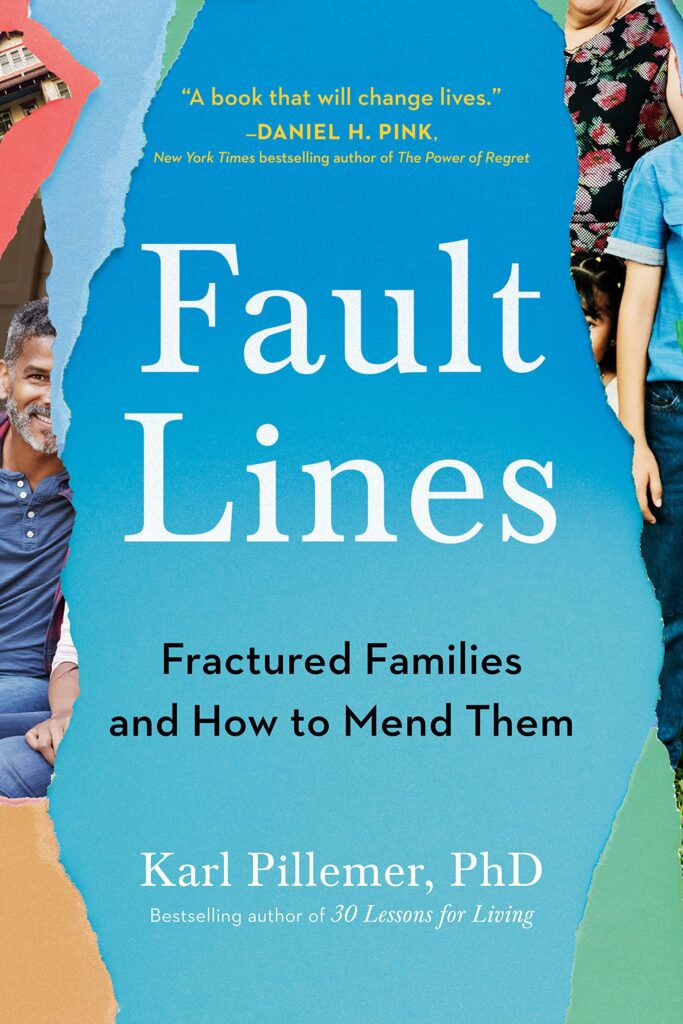
Fault Lines: Fractured Families and How to Mend Them by Karl Pillemer
Estrangement from a family member is one of the most painful life experiences. Fault Lines shares findings from Dr. Pillemer’s ten-year groundbreaking Cornell Reconciliation Project, based on the first national survey on estrangement; rich, in-depth interviews with hundreds of people who have experienced it; and insights from leading family researchers and therapists. He assures people who are estranged, and those who care about them, that they are not alone and that fissures can be bridged.
Tackling a subject that is achingly familiar to almost everyone, especially in an era when powerful outside forces such as technology and mobility are lessening family cohesion, Dr. Pillemer combines dramatic stories, science-based guidance, and practical repair tools to help people find the path to reconciliation.
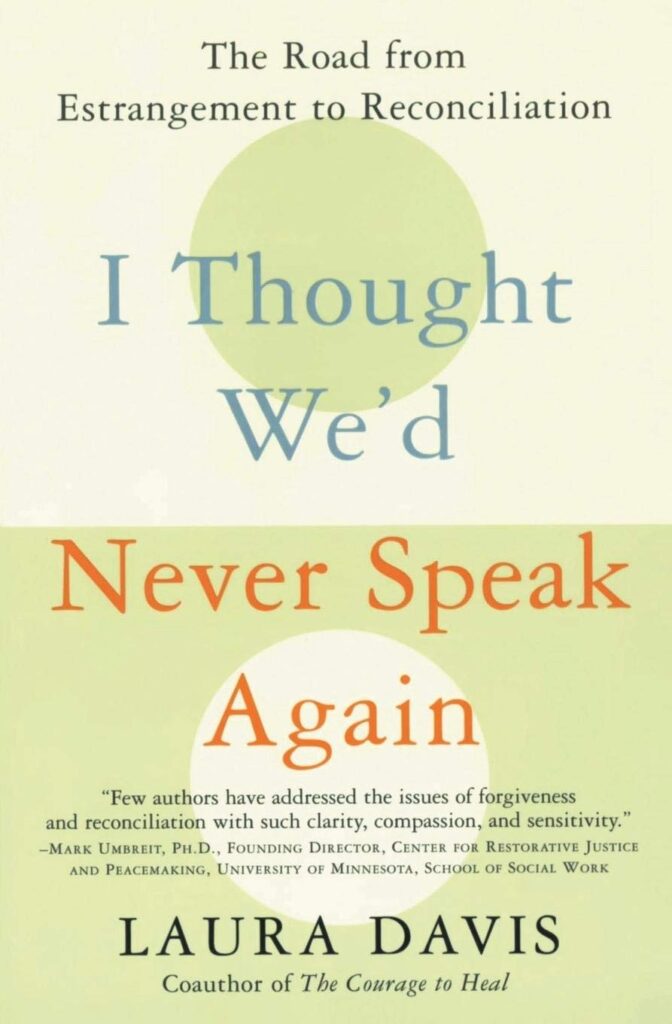
I Thought We’d Never Speak Again by Laura Davis
With clarity and compassion, Davis maps the reconciliation process through gripping first-person stories of people who have mended relationships in a wide variety of circumstances. In these pages, parents reconcile with children, embittered siblings reconnect, angry friends reunite, and war veterans and crime victims meet with their enemies. Davis weaves these powerful accounts with her own experiences reconciling with her mother after a long, painful estrangement.
Making a crucial distinction between reconciliation and forgiveness, Davis explains how people can make peace in relationships without necessarily forgiving past hurts. In addition to a special section called “Ideas for Reflection and Discussion,” she includes a self-assessment quiz, “Are You Ready for Reconciliation?”
Whether you want to reconcile a relationship that has ended, improve a relationship that is difficult or distant, or learn the skills you need for dealing with the inevitable conflicts we face in life, this book will teach you to mend troubled relationships and find peace.

Adult children of Emotionally Immature Parents by Lindsay Gibson
If you grew up with an emotionally immature, unavailable, or selfish parent, you may have lingering feelings of anger, loneliness, betrayal, or abandonment. You may recall your childhood as a time when your emotional needs were not met, when your feelings were dismissed, or when you took on adult levels of responsibility in an effort to compensate for your parent’s behavior. These wounds can be healed, and you can move forward in your life.
In this breakthrough book, clinical psychologist Lindsay Gibson exposes the destructive nature of parents who are emotionally immature or unavailable. You will see how these parents create a sense of neglect, and discover ways to heal from the pain and confusion caused by your childhood. By freeing yourself from your parents’ emotional immaturity, you can recover your true nature, control how you react to them, and avoid disappointment. Finally, you’ll learn how to create positive, new relationships so you can build a better life.
Discover the four types of difficult parents:
The emotional parent instills feelings of instability and anxiety
The driven parent stays busy trying to perfect everything and everyone
The passive parent avoids dealing with anything upsetting
The rejecting parent is withdrawn, dismissive, and derogatory
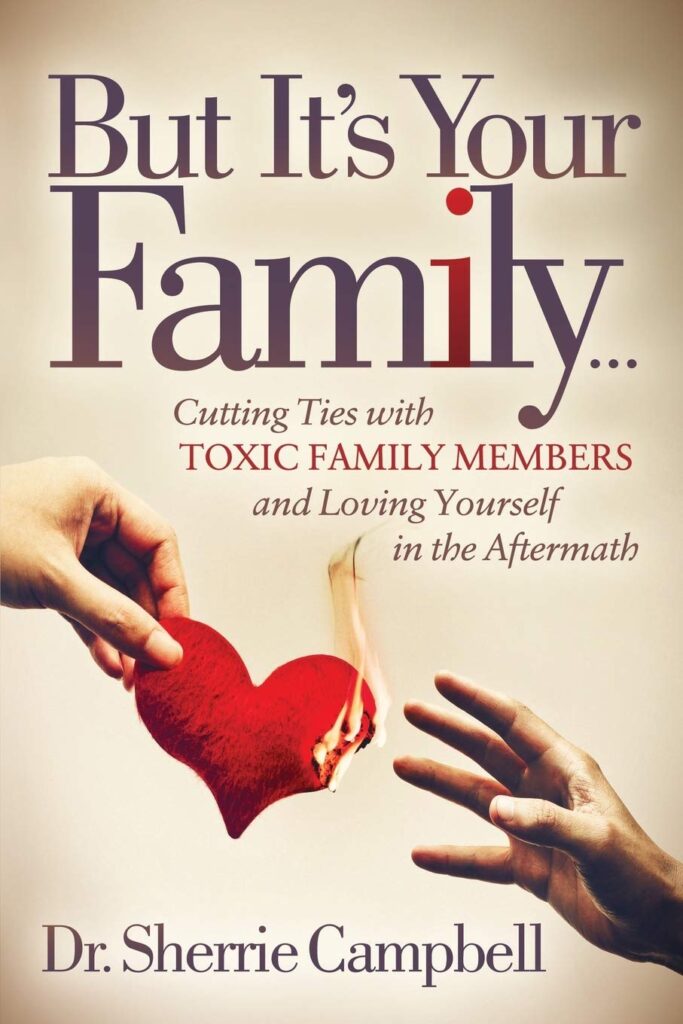
But It’s Your Family: Cutting Ties with Toxic Family Members and Loving Yourself in the Aftermath by Dr. Sherrie Campbell
Toxic family abuse is always two-fold. The first layer of abuse is the original poor treatment by toxic family members, and the second is someone’s denial of the ways in which abusers treat and harm them. Loving someone doesn’t always mean having a relationship with them, just like forgiveness doesn’t always mean reconciliation. A significant part of healing comes with accepting that there are some relationships that are so poisonous that they destroy one’s ability to be healthy and function best. But It’s Your Family is a remarkable account of what it means to cut ties to toxic family abuse and thrive in the aftermath.
Inside, Dr. Sherrie Campbell clarifies: how parents, adult children, siblings, and in-laws can be toxic, the difference between flawed and toxic family members, explaining the cutting of ties to children and others who may not understand, spiritual and religious views on forgiveness, the definition of cutting ties, and what No Contact actually means.
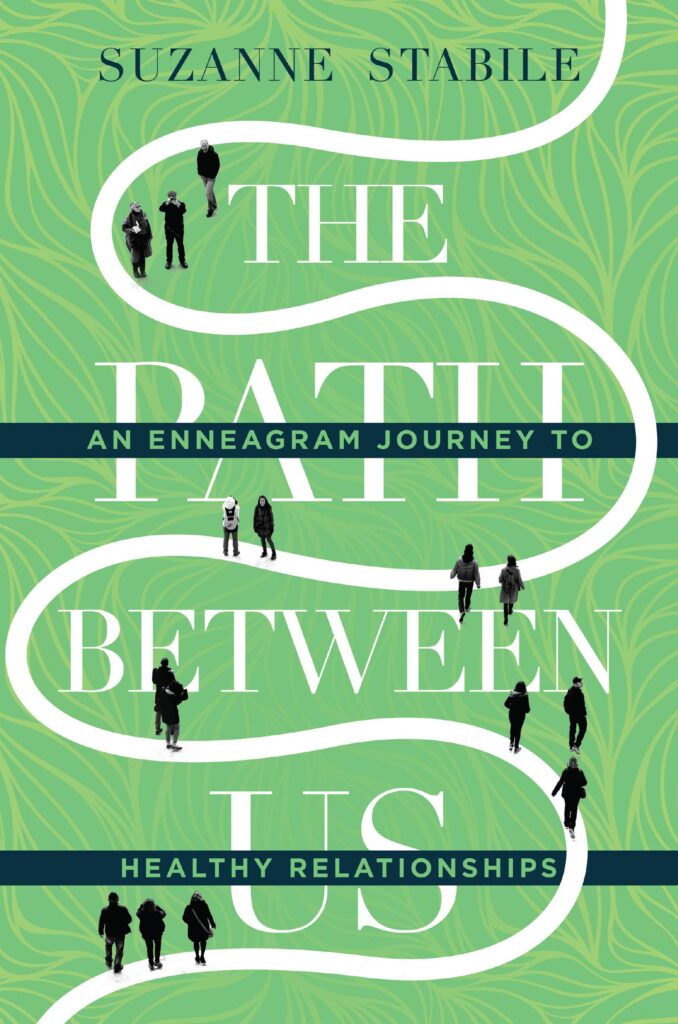
The Path Between Us: An Enneagram Journey to Healthy Relationships by Suzanne Stabile
Most of us have no idea how others see or process their experiences. And that can make relationships hard, whether with intimate partners, with friends, or in our professional lives. Understanding the motivations and dynamics of these different personality types can be the key that unlocks sometimes mystifying behavior in others―and in ourselves.
This book from Suzanne Stabile on the nine Enneagram types and how they behave and experience relationships will guide readers into deeper insights about themselves, their types, and others’ personalities so that they can have healthier, more life-giving relationships. No one is better equipped than Suzanne Stabile, coauthor, with Ian Morgan Cron, of The Road Back to You, to share the Enneagram’s wisdom on how relationships work―or don’t.
The Enneagram not only answers these questions but gives us a way out of our usual finger pointing and judging of other people―and finding them wanting, perplexing, or impossible. Suzanne’s generous, sometimes humorous, and always insightful approach reveals why all the types behave as they do. This book offers help in fostering more loving, mature, and compassionate relationships with everyone in our lives.







